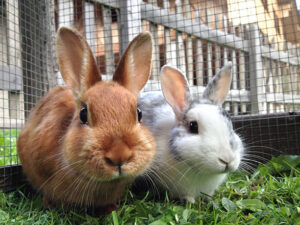As the summer heat approaches, ensuring the comfort and well-being of your rabbit becomes paramount. Rabbits are sensitive to heat and can suffer from heat stress, which can lead to serious health issues. This comprehensive guide will provide you with effective strategies to keep your furry friends cool during the hot summer months.
Understanding Rabbit Heat Sensitivity
Rabbits are naturally more comfortable in cooler environments. Their thick fur and inability to sweat make them susceptible to overheating, especially when temperatures soar above 75°F (24°C). Understanding the signs of heat stress is crucial for proactive care. Symptoms include:
- Panting
- Lethargy
- Drooling
- Increased heart rate
If you notice any of these signs, take immediate action to cool your rabbit down.
1. Provide Shade and Shelter
Outdoor Setup
If your rabbits live outdoors, the placement of their hutch is critical.
- Shade: Ensure the hutch is in a shaded area, such as under a tree or a shaded patio. Consider using shade cloths or tarps for additional protection against direct sunlight.
- Ventilation: A hutch with proper ventilation can help maintain cooler air circulation. Look for designs that allow airflow without exposing your rabbit to direct sunlight.
Indoor Setup
For indoor rabbits, keep their living space cool.
- Air Conditioning: If possible, maintain a comfortable room temperature between 60°F and 70°F (15°C to 21°C) using air conditioning or fans.
- Avoid Heat Sources: Keep their enclosure away from radiators, heat vents, or windows that get direct sunlight.

2. Use Cooling Mats and ItemsCooling mats can provide a soothing place for your rabbit to rest.
- Purchase or DIY: You can buy specialized cooling mats designed for pets or create your own by placing a ceramic tile or a damp towel in their area.
- Chill Before Use: For an added cooling effect, chill the items in the refrigerator before placing them in the rabbit’s enclosure.
Differences Table: Cooling Options for Rabbits
| Cooling Method | Description | Pros | Cons |
|---|---|---|---|
| Cooling Mats | Mats that stay cool for rabbits to lie on. | Easy to use; helps regulate temp. | May need frequent chilling. |
| Ceramic Tiles | Chilled tiles placed in the enclosure. | Cost-effective; naturally cool. | Can become too cold if left too long. |
| Wet Towels | Dampen towels and place in the rabbit’s area. | Quick and easy to prepare. | Needs to be replaced often. |
| Frozen Water Bottles | Fill a bottle with water and freeze it. | Provides cooling when placed near rabbits. | Risk of them chewing on bottles. |
3. Ensure Proper Hydration
Hydration is essential for keeping your rabbit cool and healthy.
- Fresh Water: Always provide access to fresh, cool water. Change the water daily and consider adding ice cubes to keep it chilled.
- Water Bottles vs. Bowls: While both options are suitable, some rabbits prefer drinking from bowls, which can also help them stay cooler during hot days.
4. Monitor and Manage Temperature
Temperature Checks
Keeping track of the indoor and outdoor temperatures is vital.
- Thermometers: Use thermometers to monitor the temperature in your rabbit’s environment.
- Recognizing Limits: If temperatures exceed 75°F (24°C), take extra measures to cool down the area and your rabbit.

Utilize Fans
Creating a breeze can help lower the temperature:
- Fan Placement: Position fans to circulate air around the enclosure but avoid direct airflow onto your rabbit.
- Natural Airflow: Opening windows during cooler times of the day can help lower indoor temperatures.
5. Limit Exercise During Hot Days
Avoid strenuous activities during the hottest parts of the day.
- Scheduled Playtime: Plan playtime in the early morning or late evening when temperatures are cooler.
- Gentle Activities: Engage your rabbit in light activities to avoid overheating.
6. Groom Regularly
Regular grooming helps keep your rabbit comfortable.
- Shedding: Rabbits tend to shed more in the summer. Regular brushing can remove loose fur and reduce the amount of heat they retain.
- Haircuts: While it’s not recommended to shave your rabbit, trimming long fur around the paws can help minimize heat retention.
7. Offer Fresh Vegetables
Fresh veggies can aid hydration and provide a cooling effect.
- Water-Rich Options: Offer vegetables like cucumbers, celery, and lettuce. These not only keep them hydrated but also add variety to their diet.
- Avoid Overfeeding: While fresh veggies are beneficial, ensure they are part of a balanced diet and do not replace hay or pellets.

8. Create a Digging Box
A digging box can provide both enrichment and a cooling area for your rabbit.
- Use Cool Materials: Fill a box with cool, damp soil or shredded paper to encourage natural digging behavior while keeping them cool.
- Location Matters: Place the digging box in a shaded area for maximum comfort.
9. Be Mindful of Stress Factors
Stress can exacerbate heat sensitivity.
- Calm Environment: Ensure a quiet and calm environment for your rabbit, particularly during extreme heat.
- Use Calming Aids: Consider using calming products like pheromone diffusers designed for pets.
Conclusion
Keeping your rabbit cool during the summer months is essential for their health and happiness. By providing shade, hydration, cooling options, and a comfortable environment, you can help your furry friend beat the heat. Remember to monitor your rabbit’s behavior closely and make adjustments as necessary to ensure they remain cool and comfortable. With these tips, you can enjoy a happy summer with your beloved bunny!
FAQs
1. What temperature is too hot for rabbits?
Rabbits are sensitive to heat and can become stressed when temperatures exceed 75°F (24°C). It’s important to monitor their environment and take action if temperatures rise above this threshold.
2. How can I tell if my rabbit is overheating?
Signs of overheating in rabbits include panting, drooling, lethargy, and an increased heart rate. If you notice any of these symptoms, move your rabbit to a cooler area immediately and provide water.
3. Is it safe to give my rabbit a bath in the summer?
No, it’s not recommended to bathe your rabbit, as it can lead to stress and disrupt their natural temperature regulation. Instead, use a damp cloth to gently wipe them down if necessary.

[…] especially those that are high in vitamin C and antioxidants, can also help keep your ear canal moisturized. These foods support overall health by strengthening the immune system, which may reduce the risk […]